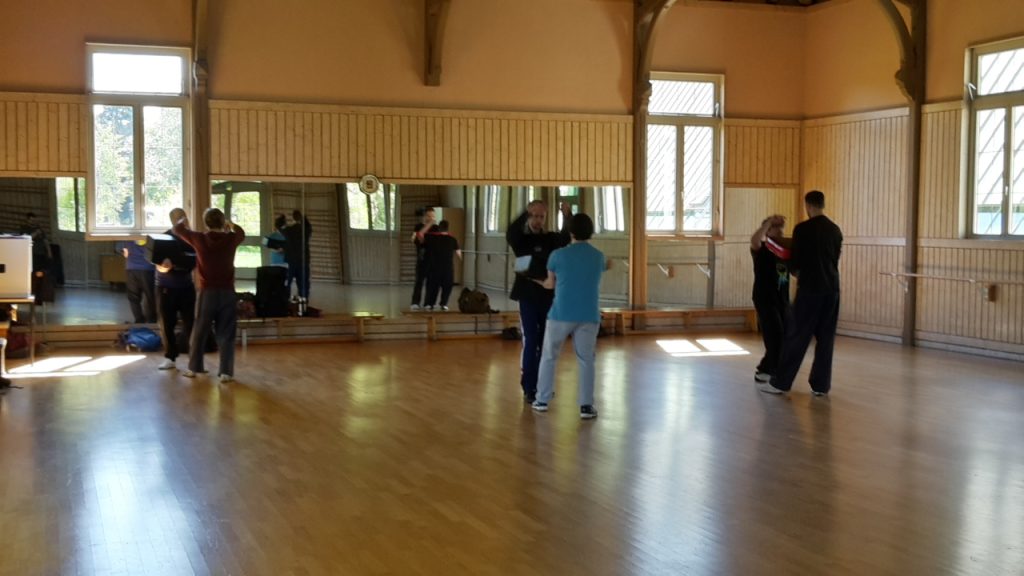EFeXX Spring Workshop 2017
Topic: Applications from traditional techniques
Date: 28.4. – 1.5.2017
Place: Konstanz am Bodensee
Location: Sports Hall of the University of Konstanz
Author: Daniel Beis
Friday
The first spring workshop in 2017 of the European Federation for Xin Yi and Xing Yi Kungfu (EFeXX e.V.) started on Thursday the 28th April with the arrival of the participants at Konstanz aside the Lake of Konstanz (Bodensee). After some Szechuan cuisine we had a first discussion about the aims and purposes to train Kungfu and martial arts in contrast to martial/combative sports. During the evening it became obvious, that everyone appreciate typical training aspects comprising fitness and stamina, as well as mindfulness and self-defence, however, the interconnecting approach of all those aspects linked with an elaborated cultivation of the whole person, is the reason why people chosen traditional martial arts.
Saturday
At Friday morning, a talk about a training model for partner drills, application training and sparring opened the workshop. Daniel Beis described a preliminary system of how to focus on different fields of solo- and partner-training (e.g. cardio, mobility, tactics, technics, power types, etc.). The main focus laid on the different types of partner drills and the analysis what skills you can improve by a particular exercise and what aims you should achieve in different types of partner training, such as da shou, rou shou, etc. The concept of Li and Jin was discussed to stress the importance of “intelligent training”, i.e. that you should know what methods you should choose for what purpose.
Afterwards we started the first practical session with examples of pre-arranged partner drills from Xin Yi Kungfu-family styles focussing on technique application, rhythm and distance training. Later we shifted to drills that successively increase the degree of freedom and technique variations for either the “aggressor” or the “responder”.
In the evening, Mark Hauser (Dipl. Psych) gave us a detailed introduction about the modern theory and application of therapeutic hypnosis. During this session we also performed some basic exercises for self-awareness and perception of others. These examples gave an overview about the modern methods used in therapeutic hypnosis, which have several striking parallels to imagination and mind-set exercises known in traditional martial arts.
Dǎ shǒu ( 打手, hitting hands): is a training method where one partner attacks with the same type of technique while the other counters with the same or different techniques.
Rou shou (XXX, soft hands): is a similar training setting as Tui Shou ( 推手, sticking hands), however in most lineages this partner drill is more active (“yang loaded”) and rougher, but still focusses on sensibility and stability.
Lì (力, strength, force, power): this character, which illustrates an arm and a plow, indicates some kind of muscle power, which can be trained and forceful.
Jìn (劲 or 勁, vigor, energy, strength): in contrast to mere muscle power, Jìn refers to a kind of martial force which results from coordinated body usage and intelligent training of movement patterns.
Xin Yi Kungfu-family styles: In the scope of EFEXX we understand Xing Yi Quan, Xin Yi Liu He Quan, Yi Quan, and others as branches of a Xin Yi kungfu family, sharing similar concepts, methods, and philosophy though with different emphasis.

Saturday
On Saturday we spent three practical session for analysing the remaining partner exercises, such as partner tao lü, matt training, rou shou and variable unarranged sparring exercises.
Rather than directly start free sparring, we focused on this day on technical aspects that precedes free fright scenarios in order to increase the perception of particular partner training goals, such as finding entries, modify speed, initiate and disturb rhythm, distance awareness, technic variations, etc.
In the evening we had dinner nearby Lake of Konstanz and visited the historical city center which was never destroyed since 12th century.
Monday
We closed the workshop on Monday with a relaxing breakfast summarizing and reflecting the different partner exercises and applications.
About the speakers
Daniel Beis works currently as PostDoc in biological work- and health psychopoly at the University of Konstanz, investigating biopsychological effects of stress prevention techniques. He trains and teaches Xin Yi Kungfu family styles as inner door student of Master Li Lee (till 2013) and of Master Lü Yan Zhe (since 2015).
Mark Hauser studied psychology in Bern (Switzerland) before he moved to Konstanz University to work as scientific staff member. He shifted into psycho-therapeutical practice for several years and is trained in therapeutic hypnosis, as well as in systemic therapy. Currently he works as psychotherapists in Konstanz, Stuttgart, and Freiburg and gives trainings for different companies in south Germany.
